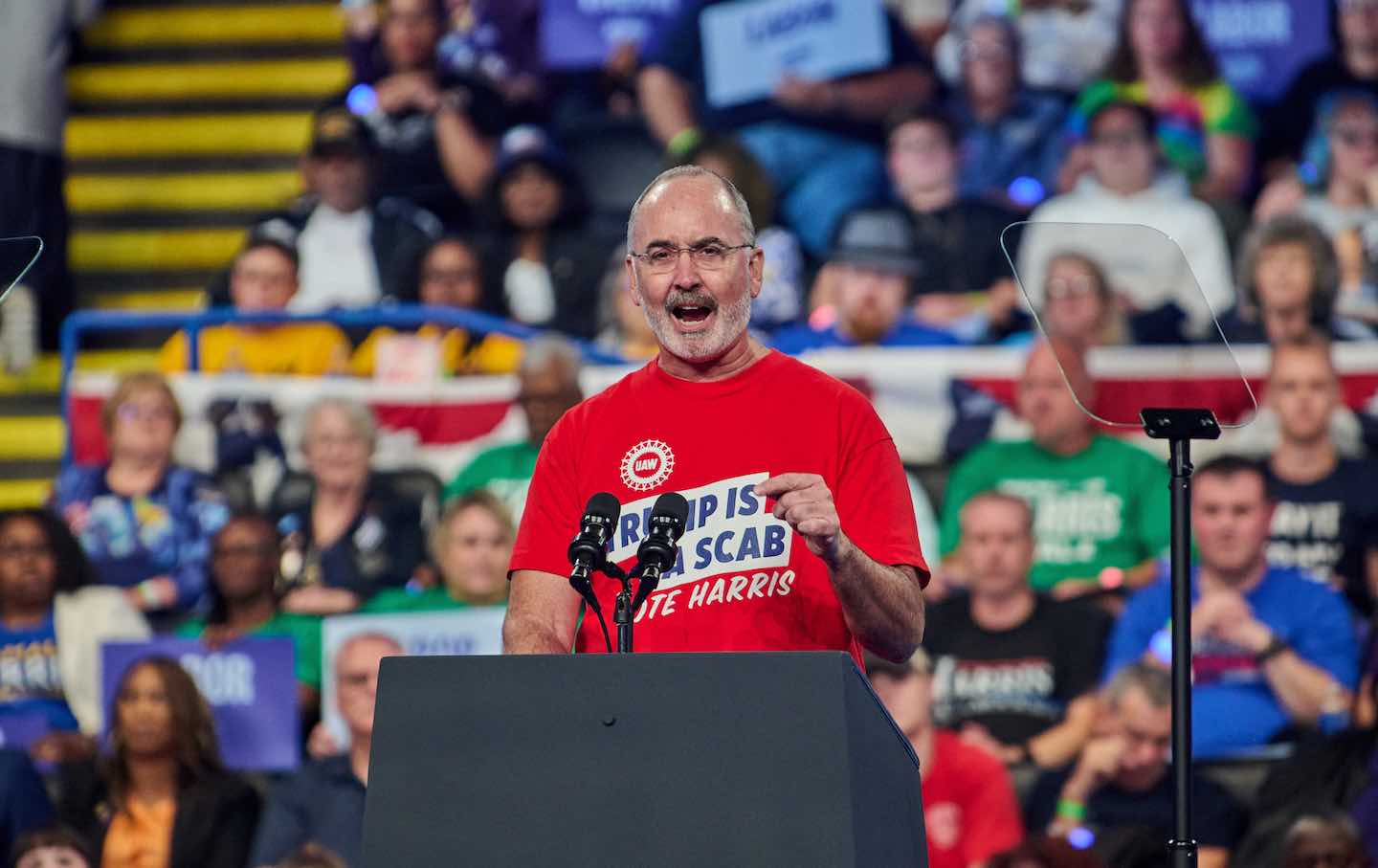Why the GOP Removed Anti-Gay Language From Its Platform
Amid many Republicans’ continued hostility to LGBTQ rights in state legislatures, Democrats call the RNC’s removal of opposition to same-sex marriage “political theater.”

Supporters of Donald Trump gather outside of the Stonewall Inn as President Joe Biden’s motorcade passes by in New York City.
(Spencer Platt / Getty)
On July 15, thousands of Republican delegates descended upon the Fiserv Forum in Milwaukee, Wisconsin, to approve a new Donald Trump–driven party platform, which, among many other changes, removed the GOP’s formal opposition to same-sex marriage. The 2016 platform explicitly defined “natural marriage” as being between one man and one woman and opposed the US Supreme Court’s landmark decision Obergefell v. Hodges, and was renewed in 2020 without change, to fiery criticism from some conservative strategists and LGBTQ+ Republicans at the time.
The 2024 platform, however, makes no mention of same-sex marriage, but calls on Republicans to “promote a culture that values the sanctity of marriage.” On paper, it’s a seemingly substantial reversal for a party whose 2016 presidential candidates called Obergefell v. Hodges “judicial tyranny” and argued that same-sex marriage would cause an “all-out assault against the religious freedom rights of Christians.”
Charles Moran, president of the Log Cabin Republicans, the United States’ largest Republican organization for LGBTQ+ conservatives, said the removal is indicative of growing efforts from the GOP to include LGBTQ+ people. Moran views the party’s progress on inclusion as “huge,” and added that he has attended two decades of Republican National Conventions.
Moran went to his first RNC as a staffer in New York City in 2004, amid a Bush-era conservative movement virulently hostile to same-sex marriage. “The Republicans were campaigning on a constitutional ban to same-sex marriage,” Moran told The Nation. “If you look, you know, exactly 20 years later, 2004 to 2024, the party has done a 180 degree flip.”
Moran largely credits former president Donald Trump for the removal, adding that there are, in his view, a small group of powerful and connected Republicans who leveraged their political and financial influence to keep opposition to same-sex marriage on the party’s platform: Moran specifically named Heritage Foundation president and Project 2025 architect Kevin Roberts, as well as Tony Perkins, president of the anti-LGBT group Family Research Council. In spite of these figures’ influence, the new platform, he says, brings the party’s stance on same-sex marriage closer to the general Republican electorate.
According to Dr. Don Haider-Markel, a University of Kansas political science professor who studies public opinion, the removal is driven by Trump’s personal ambivalence toward same-sex marriage and the Republican Party’s ability to use culture-war attacks against LGBTQ+ people, while simultaneously disengaging from a same-sex marriage debate that’s already largely settled.
“They got what they wanted,” Haider-Markel told The Nation. “Being able to say they’re anti-LGBTQ+, without having to keep sort of rehashing the same-sex marriage debate.” He called it a “cynical approach” by far-right Republicans. “They think the real threat of the LGBTQ community is its impact on their own children and families,” Haider-Markel continued. “As long as they can push back on things like what’s available in public libraries and in public schools and can isolate their children from those influences they’re okay with [same-sex marriage].”
The removal comes as approval of same-sex marriage among Americans has dropped slightly in recent years—from 71 percent to 69 percent since 2022, according to a June 2024 Gallup poll. The decline is most pronounced among Republicans, who fell from 55 percent approving same-sex marriage in 2022 to 46 percent approving in 2024. Both Moran and Haider-Markel pointed to “culture war” issues to explain the decline, though they differed in their reasoning: Haider-Markel says Republicans may feel less pressure to support gay marriage amid a political climate more hostile to LGBTQ+ people, while Moran said the exposure of “radical gender theory” has engendered less sympathy toward gay marriage from America at large.
But even as Republicans removed formal opposition to same-sex marriage, they have also introduced a record numbers of anti-LGBTQ+ bills in recent years—510 in 2023 compared to 180 in 2022, according to the American Civil Liberties Union. Though an increasing number of anti-trans bills are making their way across the nation, Moran says the Log Cabin is “not cutting the transgender community out of our coalition,” distinguishing what he views as “radical gender theory” from support for trans people broadly.
Party higher-ups may disagree with Moran’s sentiment. As he gave his first remarks at the RNC on July 18, Trump misgendered a swath of trans athletes when he promised that, under his administration, “we will not have men playing in women’s sports.” Numerous other GOP mainstays, like Wisconsin Senator Ron Johnson and Georgia Representative Marjorie Taylor Greene, espoused hateful rhetoric toward trans people from the convention floor.
Haider-Markel says that though the GOP’s warmer attitude toward same-sex marriage could indicate that it might be willing to eventually modify an explicit opposition to transgender rights, Republicans have an electoral and political incentive to continue pushing anti-trans policy. “It’s gonna be a long time before this period of backlash against transgender folks ends,” said Haider-Markel. “Those kinds of successes in so-called blue areas really tell Republicans that this issue going forward is a good one to continue to push on, however they can.”
The 2024 platform, too, does not endorse equal rights for LGBTQ+ people. In fact, the only mention of LGBTQ+ people is a section opposing “left-wing gender insanity.” Moran said he sees it as “insulting” to be asked how he felt about the lack of endorsement, and added that, given legal protections for LGBTQ+ people, the lack of endorsement does not bother him. “I don’t need a specific endorsement of my life by my party,” said Moran. “Democrats like to do that shit. We don’t do that in the Republican Party.”
Though it may no longer be officially sanctioned by the party, GOP opposition to same-sex marriage is still common. In 2022, Congress introduced a bill to codify same-sex marriages into federal law—spurred by Supreme Court Justice Clarence Thomas’ suggestion that the court should “reconsider” its Obergefell decision. More than 160 Republican representatives and 36 Republican senators voted against it. Trump’s choice for vice president, Ohio Senator J.D. Vance, said that he would have voted against the bill had he been in office at the time.
Democrats, for their part, say that the Republican party is simply trying to mask a long-standing opposition to LGBTQ+ rights. “Despite any changes to their convention platform, Republicans have made their priorities crystal clear in the states,” Will Rusche, vice president of marketing and communications for the Democratic Legislative Campaign Committee, told The Nation. “Villainizing LGBTQ+ people and attacking their fundamental freedoms is a mainstay of the Republican party and we’ve seen over 1,000 anti-LGBTQ+ bills introduced in state legislatures in just the last two years alone.” Iowa Republicans in 2023 filed a bill that would ban same-sex marriage in the state, and in 2022, Texas Republicans approved a party platform that opposed same-sex marriage and called homosexuality an “an abnormal lifestyle choice.”
Popular
“swipe left below to view more authors”Swipe →In Wisconsin, the RNC host state, LGBTQ+ legislative caucus chair and Democratic state Senator Mark Spreitzer has fought since the Obergefell decision to remove numerous instances of statutory language that define marriage as between a man and woman. It’s something he notes can affect programs like a “husband and wife” fishing license discount or ensuring that same-sex parents have parity in parental rights with heterosexual parents. Each time he has introduced a bill to do so, he told The Nation, it has died in legislative committees without receiving a committee vote or floor vote.
Wisconsin, in addition, is one of 25 states that still have non-enforceable statutory and constitutional bans on same-sex marriage, according to a 2022 report from the Movement Advancement Project, as Wisconsinites voted in 2006 to ban same-sex marriage through an amendment that still exists within the state’s Constitution. Efforts from Spreitzer to remove that amendment—something that he notes could protect LGBTQ+ Wisconsinites’ marriage rights, were Obergefell to be overturned—have been similarly stalled, he said.
Amid many Wisconsin Republicans’ hositility to LGBTQ+ rights, the RNC’s removal of language around same-sex marriage is “political theater,” according to Spreitzer. “I’ll believe that Republicans have removed their opposition to same-sex marriage when they actually are ready to remove the ban on same-sex marriage from our state Constitution and our state statutes.”
Can we count on you?
In the coming election, the fate of our democracy and fundamental civil rights are on the ballot. The conservative architects of Project 2025 are scheming to institutionalize Donald Trump’s authoritarian vision across all levels of government if he should win.
We’ve already seen events that fill us with both dread and cautious optimism—throughout it all, The Nation has been a bulwark against misinformation and an advocate for bold, principled perspectives. Our dedicated writers have sat down with Kamala Harris and Bernie Sanders for interviews, unpacked the shallow right-wing populist appeals of J.D. Vance, and debated the pathway for a Democratic victory in November.
Stories like these and the one you just read are vital at this critical juncture in our country’s history. Now more than ever, we need clear-eyed and deeply reported independent journalism to make sense of the headlines and sort fact from fiction. Donate today and join our 160-year legacy of speaking truth to power and uplifting the voices of grassroots advocates.
Throughout 2024 and what is likely the defining election of our lifetimes, we need your support to continue publishing the insightful journalism you rely on.
Thank you,
The Editors of The Nation
More from The Nation

JD Vance Shows That the Future of the GOP Is in Racist Conspiracy Theories JD Vance Shows That the Future of the GOP Is in Racist Conspiracy Theories
Trump’s deluded fantasies have now become the GOP gospel.

Donald Trump Just Insulted Every Autoworker in Michigan Donald Trump Just Insulted Every Autoworker in Michigan
The Republican presidential candidate claims that children could do the assembly-line jobs of America autoworkers. That should disqualify him in “blue wall” battleground states.

The Harris Campaign Needs to Name Other Culprits Besides Donald Trump The Harris Campaign Needs to Name Other Culprits Besides Donald Trump
By not naming those responsible for the economic woes that still plague working Americans, Democrats lack a credible story about what they’re going to change—and who is to blame.

Finally, the Democrats Call Trump the F-Word Finally, the Democrats Call Trump the F-Word
After months of talking around the obvious, the Democrats have realized that it might be a good idea to call a fascist a fascist.




